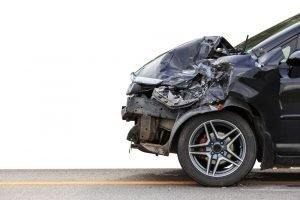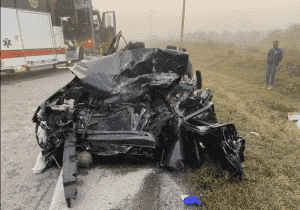
To handle a rear-end Miami car accident claim, you should immediately ensure safety, document the scene, seek medical attention, notify your insurance company, and consult with a qualified legal professional to protect your rights and maximize your compensation.
Rear-end collisions are among the most common types of traffic accidents in Miami, often resulting in significant injuries and property damage. While the rear driver is typically presumed at fault, handling the insurance claim process can be complex and challenging.
A skilled Miami car accident lawyer can help you handle your rear-end Miami car accident claim. Understanding the proper steps to take after a rear-end accident can make a substantial difference in the outcome of your claim and your ability to recover damages.
Immediate Steps After a Rear-End Car Accident
First, move your vehicle to a safe location if possible and turn on your hazard lights. Check yourself and your passengers for injuries, and call 911 if anyone requires medical attention. Even if injuries seem minor, it’s important to have emergency responders evaluate the situation, as some injuries may not be immediately apparent.
Contact the Miami Police Department to report the accident. Florida law requires police reports for most crashes, especially if an injury is involved. The responding officer will create an official accident report, which becomes crucial evidence for your claim.
Documenting Your Miami Rear-End Accident
Proper documentation serves as the foundation of a successful rear-end accident claim. The more evidence you can gather at the scene and in the days following the accident, the stronger your case will become when dealing with insurance companies.
Take extensive photographs from multiple angles, including wide shots showing the overall scene and close-up images of specific damage.
Capture the positions of both vehicles, any skid marks on the roadway, traffic signs or signals, and the surrounding environment. These visual records help establish fault and demonstrate the severity of the impact.
Keep detailed records of all medical treatment received, including emergency room visits, follow-up appointments, physical therapy sessions, and prescription medications. Medical documentation directly links your injuries to the accident and provides evidence of your damages.
Understanding Fault in Miami Rear-End Collisions
The presumption of fault against the rear driver exists because drivers are expected to maintain a safe following distance and remain alert to traffic conditions ahead.
However, certain circumstances can shift or share fault, such as when the front driver suddenly reverses, has non-functioning brake lights, or makes an unexpected lane change.
Insurance adjusters will investigate various factors to determine fault, including vehicle damage patterns, witness statements, traffic camera footage, and the official police report. They may also consider road conditions, weather, and whether either driver violated traffic laws.
Understanding how fault affects your claim is crucial because Florida’s comparative negligence laws can reduce your compensation by your percentage of fault. For example, if you’re found 20% at fault for the accident, your total compensation would be reduced by 20%.
Dealing With Insurance Companies After Your Accident
Insurance claims after a rear-end accident require careful attention to detail and strategic communication. Insurance companies are businesses focused on minimizing payouts, so understanding their tactics can help protect your interests during the claims process.
Report the accident to your insurance company promptly, but provide only factual information about what happened. Avoid admitting fault or speculating about the cause of the accident. Stick to the basic facts: where and when the accident occurred, the parties involved, and any injuries sustained.
Be cautious when dealing with the at-fault driver’s insurance company. While they may seem helpful initially, remember that their goal is to settle your claim for as little as possible.
They may request recorded statements or offer quick settlements that appear attractive but fall short of covering your full damages.
- Review your insurance policy to understand your coverage options
- Keep detailed records of all communications with insurance representatives
- Don’t sign any documents without fully understanding their implications
- Be wary of early settlement offers that may not account for future medical needs
- Consider having legal representation handle insurance communications
When to Seek Legal Help for Your Rear-End Miami Car Accident Claim
Consider seeking legal assistance if you’ve sustained serious injuries that require extensive medical treatment or result in long-term disabilities. Rear-end collisions frequently cause whiplash, herniated discs, traumatic brain injuries, and other conditions that may not fully manifest until days or weeks after the accident.
Legal representation becomes particularly valuable when dealing with disputed liability, multiple parties, or insurance companies that deny or undervalue your claim.
An experienced attorney can investigate the accident, gather additional evidence, and negotiate with insurance adjusters on your behalf.
If the insurance company is pressuring you to settle quickly or is offering an amount that doesn’t cover your medical expenses and other losses, call a lawyer. Legal counsel can help evaluate whether the offer is fair and negotiate for appropriate compensation.
Maximizing Your Rear-End Accident Compensation
Understanding the full scope of damages available in a rear-end accident claim helps ensure you don’t settle for less than your case is worth. Compensation in Miami car accident cases typically includes both economic and non-economic damages.
Consider the long-term impact of your injuries when evaluating settlement offers. Some injuries may require ongoing treatment, result in permanent limitations, or affect your ability to work in the future. A comprehensive settlement should account for these future needs, not just your current expenses.
Common Mistakes to Avoid in Your Claim
Many accident victims inadvertently mishandle their rear-end Miami car accident claims by making statements or decisions that insurance companies later use against them.
Never admit fault at the accident scene or in communications with insurance companies, even if you believe you may have contributed to the accident.
Delaying medical treatment is another critical mistake that can harm your claim. Insurance companies often argue that injuries not treated immediately after an accident must not be serious or weren’t caused by the collision. Seek medical attention promptly, even if you feel fine initially.
Also:
- Don’t provide recorded statements to the other driver’s insurance company without legal advice.
- Avoid posting about your accident or injuries on social media platforms
- Don’t accept the first settlement offer without understanding your full damages
- Never sign medical authorizations that give insurance companies broad access to your records
- Don’t wait too long to file your claim, as Florida has specific time limits for personal injury cases
Moving Forward After Your Miami Rear-End Accident
Recovering from a rear-end accident involves both physical healing and financial recovery. Taking the right steps immediately after your accident and throughout the claims process can make a significant difference in your ability to obtain fair compensation and move forward with your life.
At Anidjar & Levine, our experienced legal team has handled thousands of rear-end Miami car accident claims. We understand the tactics insurance companies use to minimize payouts and fight tirelessly to protect our clients’ rights.
Call us today for a free consultation to discuss your rear-end accident claim and learn how we can help. You pay nothing unless we recover compensation for you, and we’re available 24/7 to answer your questions and provide the aggressive representation you need.










